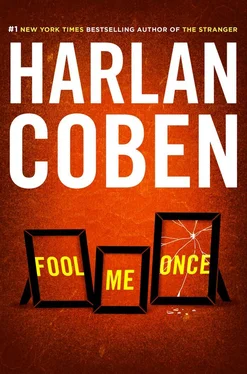Maya turned the knob and pushed open the door. The waiting room was empty and small — one love seat, one couch. The artwork was generic enough to work in a roadside chain motel. The walls and carpeting were beige. A sign on the far door read: “IN SESSION. PLEASE HAVE A SEAT.”
There was no receptionist. Maya guessed that the patients were often high profile, and so the fewer people who saw them, the better. One patient would be in session. When finished, that patient would exit into the corridor via a door located in the doctor’s office. The waiting patient — or, in this case, Maya — would then be shown in. Neither patient would see the other.
The desire for privacy and discretion was understandable, of course — Maya didn’t want anybody knowing about her “disorder” either — but it was probably harmful too. Doctors kept stressing that mental disease was the same as physical disease. Telling someone who was clinically depressed, for example, to shake it off and get out of the house was tantamount to telling a man with two broken legs to sprint across the room. That was all well and good in theory, but in practice, the stigma continued.
Maybe, to be more charitable, it was because you could hide a mental disease. Maybe if Maya could hide two broken legs and still somehow walk, she would. Who knew anymore? Right now, she had to get through this and then worry about treatment. The answers were out there, tantalizingly close. No one would be safe until she got to the truth and punished the guilty.
She might not be able to do that with broken legs. But she sure as hell could do it with PTSD.
Maya checked her watch. Five minutes until the hour was up. She tried to read whatever inane magazines were there, but the words swam by her. She played with her mobile phone, some game with making words out of four letters, but her concentration was shot. She moved close to the door. She didn’t put her ear against it and listen in, but she stood close enough to hear the low murmur of two female voices. Time passed slowly, but eventually Maya could hear the inner door open. The patient was probably exiting.
Maya hurried back to her seat, picked up a magazine, crossed her legs. Ms. Casual. The door opened, and a woman Maya guessed was a well-kept sixty smiled at her.
“Maya Stern?”
“Yes.”
“This way, please.”
So there was a receptionist, Maya thought. She just worked from inside the office. Maya followed the woman inside, assuming she would find Judith sitting at a desk or maybe on a chair next to a couch or some such shrink-like environment. But Judith wasn’t there. Maya turned to the receptionist. The receptionist stuck out her hand.
“I’m Mary.”
Maya got it now. She glanced at the diplomas on the wall. “As in Mary McLeod?”
“That’s right. I’m a colleague of Judith’s. She hoped that maybe we could have a chat.”
According to the diploma, both women had gone to medical school at Stanford. Maya spotted an undergraduate one for Judith at USC. Mary had gotten her BS from Rice University and did her residency at UCLA.
“Where is Judith?”
“I don’t know. We both only work part-time. We share this office.”
Maya did not bother hiding her annoyance. “Yes, I read your name on the door.”
“Why don’t you sit for a moment, Maya?”
“Why don’t you pound sand, Mary?”
If Mary McLeod was flustered by Maya’s belligerence, her face didn’t show it. “I think I can help you.”
“You can help me by telling me where Judith is.”
“I already told you. I don’t know.”
“Bye now.”
“My son served two tours. One in Iraq, one in Afghanistan.”
Maya couldn’t help herself. She hesitated.
“Jack misses it. That’s the part they never talk about it, isn’t it? It changed him. He hated it. And yet he wants to go back over. Part of it is guilt. He feels like he left friends over there. Part of it is something else. Something he has trouble articulating.”
“Mary?”
“What?”
“Are you lying about having a son in the military?”
“I wouldn’t do that.”
“Sure you would. You’re manipulative. You and Judith manipulated me into coming into this office. You manipulated me into this room. You’re trying various manipulations to get me to talk to you.”
Mary McLeod stood ramrod straight. “I’m not lying about my son.”
“Maybe not,” Maya said. “But either way, you and Judith should both know that without trust, you can’t have a doctor-patient relationship. This whole little sham to get me here broke that trust.”
“That’s nonsense.”
“What’s nonsense?”
“That without trust, you can’t have a doctor-patient relationship.”
“Are you serious?”
“Suppose a loved one — maybe your sister — had shown all the signs of having cancer—”
“Oh, don’t go there.”
“Why, Maya, what are you afraid of? Suppose that cancer could be cured if you just could get your loved one to a physician. If you and that physician conspired to get her into his office—”
“It’s not the same thing.”
“Yes, Maya. It is. It is exactly the same thing. You’re not getting that, but it is. You need help, just like that cancer patient.”
This was a waste of time. Maya wondered whether Mary McLeod was part of all this or if she was being sincere — if Judith had, in fact, manipulated and lied to her old colleague. It didn’t matter.
“I need to see Judith,” Maya said.
“I’m sorry, Maya. I can’t help you there.”
Maya headed for the door. “You can’t help me at all.”
Screw it.
Maya dialed the number as she headed back to her car. Judith answered on the second ring.
“I hear it didn’t go so well with my colleague.”
“Where are you, Judith?”
“Farnwood.”
“Don’t go anywhere,” Maya said.
“I’ll be waiting.”
She drove in through the service entrance again, hoping maybe to catch Isabella wandering outside or something, but the entire compound appeared empty. Maybe she should break in and poke around, see if she could find a clue as to where Isabella might be hiding, but that was risky and she didn’t have the time. Judith would know how long a ride from New York City to Farnwood would be.
The butler answered the door. Maya could never remember his name. It wasn’t something like Jeeves or Carson. It was something ordinary like Bobby or Tim. Still, as befitted his servant station, Bobby/Tim looked down his nose at her.
Without preamble, Maya said, “I’m here to see Judith.”
“Madam is expecting you,” he said in some faux British prep school accent, “in the parlor.”
“The parlor” was what rich people called a living room. Judith wore a black pantsuit and a strand of pearls that came down almost to her waist. Her earrings were silver hoops, her hair stylishly slicked back. She held a crystal glass in her hand, posed as though she were shooting a magazine cover.
“Hello, Maya.”
No need for pleasantries. “Tell me about Tom Douglass.”
Her eyes narrowed. “Who?”
“Tom Douglass.”
“I don’t know that name.”
“Think hard.”
She did. Or pretended to. After a few seconds passed, Judith shrugged theatrically.
“He worked in the Coast Guard. He investigated your son’s drowning.”
The glass dropped from Judith’s hand, shattering on the floor. Maya did not jump back. Neither did Judith. They just stood there a moment, the glass shards rolling to a stop.
There was a hiss in Judith’s voice when she asked, “What the hell are you talking about?”
If this was an act...
“Tom Douglass is a private investigator now,” Maya said. “Your family has been paying him almost ten thousand dollars a month for years. I would like to know why.”
Читать дальше












